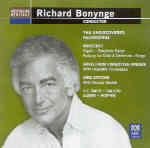There are some gems here, but before we get to those, it’s worth taking a moment to reflect on Richard Bonynge’s career as a conductor. Perhaps we’re in a position now to look at it a bit differently than we were a decade or two ago, because the current glut of recordings has created a market for unusual repertoire and has carved out a fruitful niche for those who specialize in it. The list of conductors who have made major careers out of recording little-known music is very, very large: Neeme Järvi, Osmo Vänskä, Bryden Thomson, Richard Hickox, and many others (not to mention their labels) all followed where Bonynge first led. He was a true pioneer in this respect, and music lovers owe both him and his wife, soprano Joan Sutherland, a debt of gratitude not just for all of the interesting music they revived, but also for getting a major label to support their recordings of it. For this reason alone, Bonynge’s achievement was quite remarkable, and to this day it remains little appreciated.
One of his great loves was Massenet, an easy composer to love indeed, and it’s a very happy opportunity to be able to welcome this delightful recording of Cigale back into the catalog. The music, thoroughly typical of the composer at his most winning, is just gorgeous, and the performance is perfectly stylish and alert to the work’s abundant charms. Equally interesting is a selection of rare cello concertos: Auber’s First (of four), Popper’s Concerto in E minor, and Massenet’s very pretty Fantasy for Cello and Orchestra. Cellist Jascha Silberstein has a terrific time with these attractive pieces; the Popper is particularly fine and deserves an occasional live outing, and Bonynge accompanies very sympathetically.
Perhaps the strangest items are two works–a symphony and a concerto–by J.C. Bach and Antonio Salieri. The English Chamber Orchestra plays well enough, but the music isn’t very interesting–the Salieri works are “performing editions”, and the period-instrument folks do this kind of thing much better nowadays.
In addition to finding rare repertoire, Bonynge also supported rare talent. Mezzo-soprano Huguette Tourangeau was a stalwart of his recordings with Sutherland, but this is the first time that the two solo recital discs that he made with her have been available complete on CD. The first, Arias from Forgotten Operas, offers some uncommonly interesting repertoire by Balfe, Bizet, Donizetti, Auber, Massenet, Verdi, Vacca, and Maillart in excellent performances. The other recital, a selection of Massenet songs in which Bonynge displays his skills as accompanist, fills a major gap in the CD discography of French song, and does so with enormous distinction.
Closing out the vocal portion of the program is another surprise: Renata Tebaldi’s very last “official” recording, a well chosen selection of arias by Baroque composers–Martini, Sarti, Bononcini, Handel, Scarlatti, Gluck, Pasiello, Pergolesi, Ciampi, and Vivaldi. It’s quite a collection, and although Tebaldi was well past her prime and the orchestral arrangements will raise a few eyebrows (no way is this “authentic”), it’s typical of Bonynge that he could create a project of this enterprising type, attract the interest of a major artist such as Tebaldi, and carry it off with such flair.
The only major drawback to this four-disc set is that texts are not included for the vocal items. This is a pity because these are not pieces that most people will already have in their collections. Otherwise the notes are quite authoritative, the sonics uniformly fine. Encountering this music on CD has been great fun, an invitation to share Bonynge’s joy in unusual, obscure, but almost invariably worthy music. There’s no question that Bonynge subordinated his career to that of his wife; it was his choice, of course, as was his decision only to record the music that interested him. Still, this ABC Classics tribute at last gives some personal recognition to an artist who, however unassumingly and seemingly indirectly, had a major impact on the musical tastes of the second half of the 20th century. Australia has every right to be proud, and record collectors everywhere owe him many thanks for his tireless forays into the unknown regions of our classical music heritage.
































